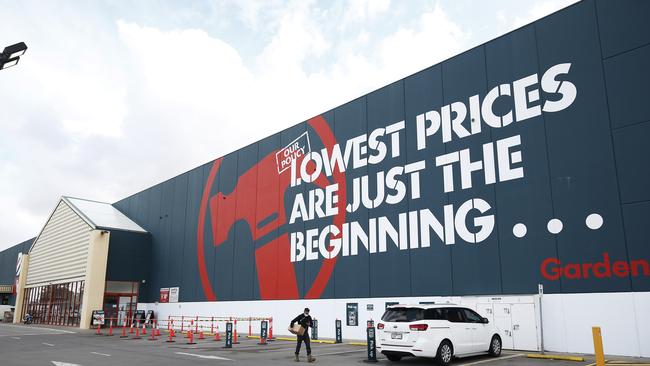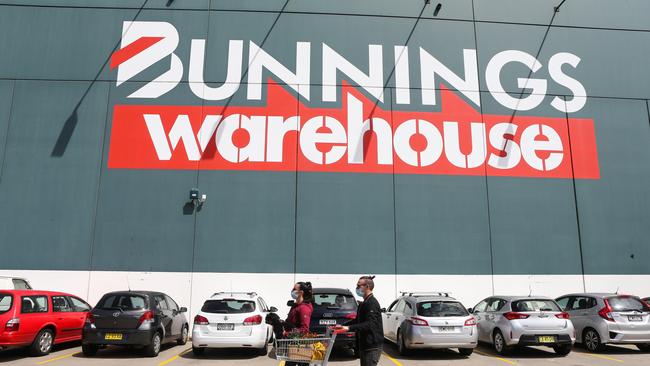UBS raises concerns about slowing sales at Bunnings, but upgrades earnings guidance for owner Wesfarmers
UBS raises concerns about the retailer’s slowing sales at Bunnings, due to poor weather conditions hitting some seasonal categories.

UBS has become the first investment firm to raise concerns over a reduction in sales momentum at hardware giant Bunnings as wet weather conditions constrict some seasonal sales for the retailer through spring and summer.
Analyst Shaun Cousins has penned a report on Bunnings owner, Perth-based conglomerate Wesfarmers, revising upwards his earnings guidance for 2023 and 2024 driven by its Kmart and chemicals arm but somewhat offset by moderating growth at Bunnings and Officeworks.
Mr Cousins has highlighted growing concern that the poor weather conditions now blanketing much of the east coast of Australia is having a deleterious effect on Bunnings key categories such as outdoor furniture, gardening and barbecues.
“Reduced Bunnings sales and earnings before tax due to lower revenue per Bunnings store … due to lower DIY revenue – wet weather delaying, and overall reducing, spring sales, plus a more conservative outlook – albeit still above pre Covid due to a better network,” Mr Cousins said in his report.
However, he noted that Bunnings was gaining share in a larger addressable market, and greater category participation by consumers.

On Monday, The Australian reported that Bunnings, the nation’s leading hardware chain, was facing higher warehousing costs to store hardware stock it aggressively pre-ordered to support expected strong sales over spring and Christmas, only to see demand crimped by poor weather across much of the country.
The hardware giant has been forced to pay higher than usual rates for third-party warehouse space and in some instances book suboptimal locations as it faces heavy competition from other retailers also scrambling for space, while weakening consumer demand leaves many retail chains with bloated inventory levels.
While some hardware categories are growing at a double-digit pace, key hardware categories sensitive to weather conditions – such as outdoor furniture and gardening – have slowed. However, this has not been a material impact on its profitability at this stage, and recent improvements in weather conditions have seen customers return to these categories.
Apart from concerns around slowing sales at Bunnings, Mr Cousins also said he was expecting reduced Officeworks revenue due to expectations of slowing sales and a more modest rate of new category expansion.
Retail divisions – led by Bunnings, Kmart and Officeworks – comprise the majority of Wesfarmers earnings, around 82 per cent. And while Mr Cousins is more bullish about the conglomerate’s investments in lithium production and its chemicals arm, WesCEF, the performance of its retail divisions remains important as a share of earnings and investor sentiment.
“Looking forward, the Australian consumer is facing significant headwinds from the rising cost of living across energy, food, fuel and housing costs, with house prices falling,” said Mr Cousins.
“These headwinds have yet to weigh on spending with the strong labour market (low unemployment and rising wages despite falling purchasing power) and elevated recent household savings key supports as the consumer returns to traditional spending patterns and engages in catch-up spend after difficult years with Covid.”
Mr Cousins said Bunnings should benefit from strong housing demand and more sales to trade and professional customers.
“For Wesfarmers, the company is comparatively well positioned for a slower consumer environment, especially in its larger retail businesses Bunnings and Kmart. Each holds a strong value proposition for consumers with a track record of lowering prices / holding back prices in the face of cost inflation.”
Mr Cousins has revised his sales and earnings outlook for Bunnings, and has reduced his 2023 sales target by 2.1 per cent and his pre-tax earnings target for the hardware chain in 2023 by 0.9 per cent to around $2.17bn
UBS has revised its earnings per share guidance for Wesfarmers by 0.8 per cent in 2023 and up 2.8 per cent in 2024.
Wesfarmers shares were up 0.5 per cent to $48.25, giving it a market capitalisation of $54.71bn.






To join the conversation, please log in. Don't have an account? Register
Join the conversation, you are commenting as Logout